A good shove to the rusty gate and ducking woodbrush and debris to get to the back of the main building is enough to gain access inside, which is doorless. From the third floor, the windowless classrooms of the Carmen Gómez Tejera School in Aguadilla frame Desecheo Island, while an old sugar dock can be seen through the gap facing North. Time and saltpeter have not rubbed out the paint in some of the school’s hallways where slogans like “Your values are important” or “My trust is placed in you” remain.

Photo by AJR Photography | Center for Investigative Journalism
Deterioration of the classrooms in the Carmen Gómez Tejera school.
The US real estate firm The Morgan Reed Group bought for $780,000, the school, built in 1929 located on Agustín Stahl Street, with a privileged view of the Atlantic and on land that holds a pre-Hispanic and colonial site, to develop a 150-room hotel . The purchase of the Carmen Gómez Tejera School included the neighboring Rafael Del Valle School, built in 1925. Between the structures vandalized and closed since 2014 stands the only building left of what once was the Concepción Fort during the Spanish government.

Photo by AJR Photography | Center for Investigative Journalism
Morgan Reed’s plan is to turn the Carmen Gómez Tejera School into a hotel.
The approval to sell public schools to shore up resources for the government of Puerto Rico had a considerable increase in transactions since the summer of 2019. However, only 4% of the 960 schools that different administrations have closed during the last decade have turned into income for the Treasury. For some investors the process to obtain this type of property, which is overseen by a committee chaired by the head of the Fiscal Agency and Financial Advisory Authority (AAFAF, in Spanish), took between two to six months, while others have been waiting for more than a year to sign off a deal.
Among the 40 proposals approved bythe Evaluation and Disposal of Real Estate Assets Committee (CEBDI, in Spanish) , the majority plan to retain an educational purpose for the schools, such as the Julia de Burgos School in Carolina, which has become the Fountain Christian Bilingual School. Still, almost half of the 40 properties are currently abandoned or vandalized, two schools no longer exist after their new owners demolished them, and only seven are in use, an investigation by the Center for Investigative Journalism (CPI in Spanish) found.

Photo by AJR Photography | Center for Investigative Journalism
Cafeteria at the Carmen Gómez Tejera School in Aguadilla
The CEBDI approved the sale of 24 schools in 2019, an increase of 380% compared to the first transactions approved in 2018: the Genoveva Pérez School in Rincón; Antonio Sánchez in Aguada; Luis T. Baliñas in Aguas Buenas; Martin G. Brumbaugh in San Juan; and Charles T. Irizarry in Mayagüez. These transactions were not revealed until April 2019, when a subcommittee from La Fortaleza confirmed them.
The Committee ordered that another 92 schools be leased, transferred in usufruct or auctioned. Before the sale of the Mayagüez school, two other deals were closed for the Aguadilla schools and the John F. Kennedy School in Caguas, according to a list published by the AAFAF, which along with the heads of the Office of Management and Budget and the Department of Economic Development and Commerce constitute the CEBDI. The document omits the approval of another sale, the Ramón Brugueras School of Caguas, which the CPI was able to confirm by examining the Committee’s resolutions.
The sale of schools was established as public policy in 2016 through an executive order by former Governor Alejandro García Padilla that set the conditions for the sales that his successor, Ricardo Rosselló Nevares, made possible with the signing of Law 26 of 2017 that created the CEBDI. Until November, the sale of 23 schools represented $10,715,000 for the Treasury.

Photo by AJR Photography | Center for Investigative Journalism
The Special Education classrooms located at the back patio of the Carmen Gómez Tejera School.
So far, in 2020, this Committee has approved 11 transactions, even though a large part of the agencies remained closed for three to four months after the emergency declaration due to the coronavirus pandemic.
A CPI visit to the sold schools and interviews with some of their new owners provide a clearer picture of these transactions.
Early transactions
Of the first five sales disclosed in April 2019, only the John F. Kennedy School will remain as an educational institution after Caguas Learning Academy Inc. bought it for $470,000. The private bilingual and special education school has an enrollment of just over 200 students.
School principal Janice Fernández described the process for acquiring the campus as “long, uphill, and painful.” At first, she wanted to buy the Ramón Brugueras School in Caguas because it was “much smaller and we work with small groups, 12 children or less per classroom. They suddenly turned it over to a corporation and to this day that school is abandoned.”
The Morgan Reed Group bought another two schools. Its chief officer for the Caribbean region, Brian Tenembaum, submitted the proposals to buy the assets through companies registered under different names, such as Mr. Blue Ocean LLC, Mr. Bull LLC and Shinrai Holdings LLC. All three share the same representative agent, Robert A. Danial.
The firm purchased the Antonio Sánchez Ruiz School in Aguada for $460,000, after buying the two adjacent Aguadilla schools for $780,000. They believe that a hotel would be of benefit to the municipality of Aguadilla considering its proximity to a regional airport and its location in the urban center, as reflected in the Aguadilla-Isabela Destination Plan developed by the Foundation for Puerto Rico. Morgan Reed’s last purchase was the Martin G. Brumbaugh School in Puerta de Tierra, in San Juan, built in 1913 and also overlooking the Atlantic Ocean. The schoolyard is riddled with trash and desks that were once useful, and an electronic code box was installed at the main entrance to access the key to the gate.
The Morgan Reed group is based in Florida but invests in properties in states such as Illinois, Ohio and Connecticut. It was established in Puerto Rico in 2014, attracted by the exemptions offered by Acts 20 and 22, and has since picked up properties for commercial and residential use in the metropolitan area, especially in Old San Juan, Santurce and Miramar. Act 20 provides tax incentives for companies that establish and expand their export services in the island while Act 22 offers exemption from all Puerto Rico’s taxes on passive income of new residents. During the electoral period that has just ended, Tenembaum donated $8,400 to candidates from both the Popular Democratic Party and the New Progressive Party.
In Rincón, a surfing hotspot, the Genoveva Pérez School closed in 2018 and in December of that same year was sold for $485,000 to construction firm PR CR Investment Corp., owned by Carlos Rodríguez Camacho. At the end of 2019, this local investment firm bought another school in the western area, the Charles T. Irizarry in Mayagüez, for $720,000.

Photo by Tatiana Díaz Ramos | Center for Investigative Journalism
The Genoveva Pérez school in Rincón closed in 2018. That same year a sale price was approved for almost half a million dollars.
The Mayagüez school was demolished with the intention of building a shopping center, but the Office of Management and Permits (OGPe in Spanish) has not yet given the go-ahead to the construction design, Rodríguez Camacho explained to the CPI.
“The one in Rincón is so lovely. There are so many projects that I would like to do,” said the businessman, referring to the possibility of a guest house or an elderly home, but with the pandemic and the tremors “everybody’s holding back. I always provide maintenance to the property, clean it, and I’m putting it on hold in case it needs to be used as an emergency shelter,” he added.
Meanwhile, Hula Properties Inc. paid $400,000 for the Luis T. Baliñas School in Aguas Buenas, which was closed in 2018 and which the Committee put up for sale at the end of that year. Two months later, the property was signed over to Awilda Quiñones Ramos, who chairs the Board of Directors of the Econo local supermarket chain and is the second generation of a family that owns five of these stores in Aguas Buenas, Juana Díaz, Aibonito and Ponce. The school was demolished during the summer of 2019.
Between 2016 and 2018, Quiñones Ramos donated $2,400 to the New Progressive Party and the Mayor of Canóvanas, Lornna Soto; and this year she donated $1,000 to House Speaker Carlos “Johnny” Méndez. The CPI tried to contact her through the supermarket chain’s management to ask about her plans for the land where the school once sat, but the efforts were unsuccessful.
No inventory available for public real estate
The Jesús Rivera Bultrón School in Carolina, closed in 2017, has operated as a private school since April 2018 after the Rosselló Nevares administration leased it for $1 a month to Jean Louis Christian Academy & Day Care. Four months later, the CEBDI approved that it be sold for $640,000, but the contract has not yet been signed. The resolution that approves the sale does not identify the buyer.
The founder of the academy, Jessika Colón, said that “I haven’t bought it. If they sold it to someone else, I don’t know either. My lease contract is valid until December,” while confirming that the process to buy the school —with her husband and school co-founder, Luis Martínez Torres — is moving forward.
Colón, like everyone else in Puerto Rico, is unaware of the status of the property she’s leasing, contrary to what is established in the Unique Regulation for the Evaluation and Disposition of Real Property of the government. The inventory has not been published on the AAFAF website or asset map. The Real Estate Property Review Board’s Search System does not regularly update the occupancy status of buildings and public lands. Each Executive Branch agency must prepare its inventory and notify both the Committee and the Board every time there is a change (sale, rental or usufruct) related to any property.
The lack of information on the disposal of government properties leads to confusion among investors and legislators. Such was the case of the Tomás Carrión Maduro School in San Juan, bought by Cinemas Management of Puerto Rico, of the Caribbean Cinemas chain.
The sale of that school was signed in August 2020 despite the fact that the Legislature promised to lease the property to educator Joan Agosto, who was seeking to expand her nonprofit organization EduSapiens Academy. Caribbean Cinemas bought the property for $370,000 to expand its central office, which is adjacent to the school. Although construction or rehabilitation of the property is not plainly visible, the school looks clean and its parking lot is in use, the CPI confirmed. Cinemas Management administration was not available to answer questions regarding their plans for the three-building structure and a basketball court.
According to the Regulation, schools in disuse must “engage in activities for the common good, whether for the use of nonprofit or commercial organizations, or that promote the activation of the real estate market and the economy in general.”
In Ponce, the religious organization El Pesebre Inc., chaired by Pastor Ruth Pagán, took over the Román Baldorioty de Castro School in January to provide housing for earthquake victims. Four people are still sheltering there.
Pagán wants to keep the school as a shelter, but “we don’t have the $435,000 that they’re asking for the structure. We run on donations. The extension to pay that amount expired and we appealed for it to be transferred to us as a nonprofit institution, but we haven’t heard from AAFAF, or DTOP, or anything,” and she fears that the school located in the Cantera neighborhood will face the same fate as the Tomás Carrión Maduro School, which was promised to one group and given to another, for commercial purposes.
In 2018, the pastor presented a proposal to use the school and got authorization from AAFAF to clean it, “because there are like three schools together here and one of them had already been vandalized. We were afraid that they would do the same to this school.”
The purchase price proposed by AAFAF is too high for this nonprofit organization, so they decided “to temporarily change the contract to rent or use under usufruct,” said Iván Ayala Cruz, Pagán’s lawyer. Although the agency gave the go-ahead in April, it has not yet sent them the new contract for review.
The director of the Department of Human Development of the municipality of Caguas, Aida I. González Santiago, expressed concern because “we don’t know who owns some of the schools.” She explained that early on the city was interested in these schools “for social development projects,” but the municipality’s proposals were never granted, and they were awarded to other organizations.
Some of these facilities, although already in private hands, are not necessarily being maintained or operating. González Santiago said while there is a school in the Cañaboncito neighborhood “that was full of horses and this community organization decided to open it and they’re painting it, maintaining it,” there is another, the Luis Muñoz Marín school, that “is in ruins.”
Government leaves some investors in limbo
A sales contract was signed in less than a month after VLC Group, chaired by engineer Carlos Collazo Maldonado, presented a proposal to buy the Rafael Quiñones Vidal School in San Juan. Meanwhile, the Presbyterian Academy of Carolina has been trying since 2017, to buy the Lola Rodríguez de Tió School, closed in 2014.
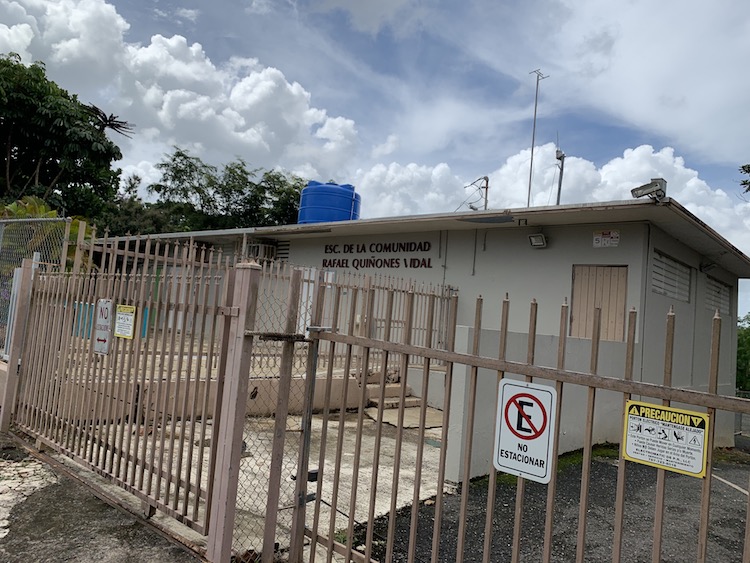
Photo by Tatiana Díaz Ramos | Center for Investigative Journalism
The transaction for the purchase of the Rafael Quiñones Vidal school in San Juan lasted less than a month. It was acquired by the VLC Group company.
According to the AAFAF, closing some sales takes time because of problems related to the registration of the property in the Property Registry, differences in dimension or capacity, a need to segregate, or because the buyer requests an extension. As of December, a total of 17 proponents await to sign a school purchase agreement.
At first glance, the CPI was able to confirm the maintenance given to the school adjacent to the Jardines de Montehiedra urbanization that VLC bought. On the other hand, Valle Arriba Heights School in Carolina is almost covered in woodbrush, at least two areas were burned, and parts of the property are used for gotcha practice.
Collazo Maldonado, who has two other companies registered for the installation of telecommunications antennas, did not respond to calls from the CPI to find out his plans for the San Juan campus. Meanwhile, the executive director of the Presbyterian Academy, Cruz A. Negrón, is losing faith about the acquisition plans to expand its educational services.
“Maybe we are fighting against something that’s not right for us or, there must be a reason for it not to have happened. That caused us to somewhat drop our interest or efforts in it because we’re disappointed” with the purchase process, said Negrón. The last communications with AAFAF and the Department of Transportation and Public Works (DTOP in Spanish) were in February and March, respectively.
The agency granted 45 days to adjust the appraisal of the property, affected by the earthquakes at the beginning of the year, while the director of the DTOP’s Property Administration Office, José A. Torres, warned that he had 30 days to close the sale of the school for $700,000. Although Negrón followed up on this in May, he has not heard from any agency.
Joseph Ortiz Mercado, president of Salinas Christian Academy, is also waiting for a response from the DTOP regarding the deeds to close the purchase of the Guillermo González School. At the beginning of the year, he proposed to buy the facility to “expand the services we offer in the academy and the community.” It will soon be a year since he submitted his proposal to the CEBDI.
Ana Pérez, director of the Emadrián School (EBS Academy Inc.), confirmed she has not heard from AAFAF since September to move ahead on the acquisition of the Braulio Dueño Colón School in Bayamón. The private bilingual school specializing in fine arts is less than a block away from that facility where it wants to expand its enrollment and include educational services for adults.
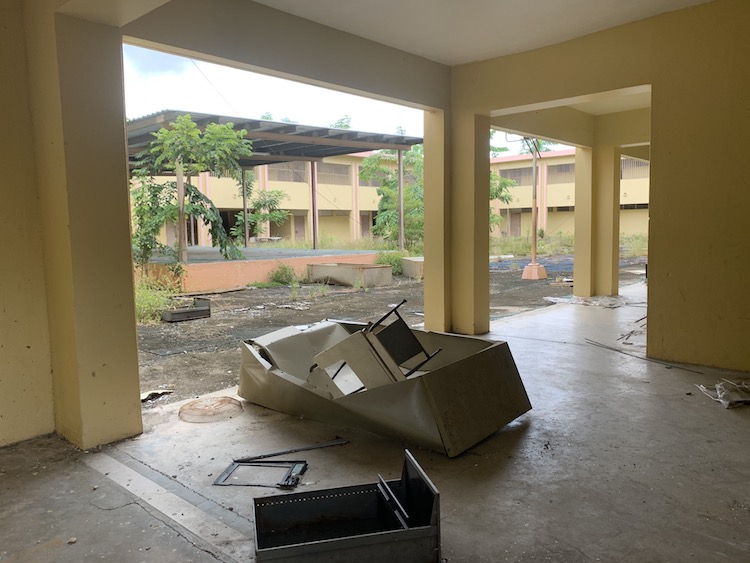
Photo by Tatiana Díaz Ramos | Center for Investigative Journalism
José Colombani Rosario school in San Juan.
The José Colombani Rosario School near Paraná Street in San Juan could serve the elderly population but the presidents of the Hogar Loma San Agustín Inc. elderly care center, Norberto Medina Zurinaga and Juanita Aponte Morales, have been waiting for months to sign off on the purchase of the campus.
Aponte Morales says she has cried throughout the process. “It’s so depressing, because I’m ready to buy tomorrow but they [the government] can’t get it together. It has been a nightmare. Every time we go by [the school] it is more deteriorated; it has become a place for drug addicts. Doors and lamps have been stolen, they broke the locks.” Medina Zurinaga, said that the last interaction he had with the Public Buildings Authority, the agency that owns the property, was eight months ago and they agreed that they needed to assess the property.
Another example of a transaction in limbo is the Alfonso López García School in Dorado. The facility looks abandoned and vandalized despite the CEBDI’s approval in December 2019 to sell it to nonprofit organization Divine Children School.
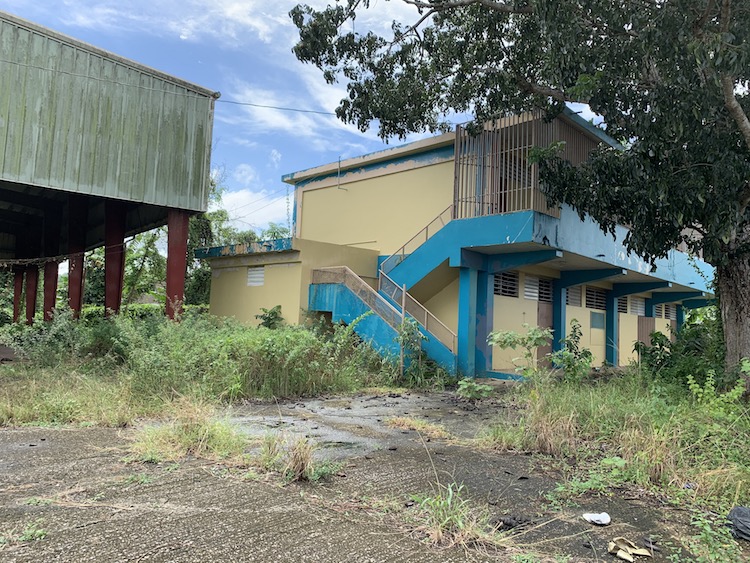
Photo by Tatiana Díaz Ramos | Center for Investigative Journalism
Alfonso López García school in Dorado.
A CEBDI resolution indicates that the Ramón Brugueras School in Caguas will be sold for $430,000 to Professional Career Training Inc., a company that has leased it since 2018 for $1 a month. The company headed by Gumersindo López Rodríguez, donor of the New Progressive Party and former Governor Ricardo Rosselló Nevares, has had $9,328,854 in Government contracts since at least 2008 to provide student services and training.
“I’ve contacted them several times to renew the lease. I have the option to buy, and about a week ago I was informed that they were evaluating that proposal,” López Rodríguez told the CPI.
Head Start program encourages deals between municipalities and nonprofit organizations
Seven municipalities got funding through the federal Head Start and Early Head Start programs to buy 10 schools and expand these services. The first to pick up closed schools were Utuado and Canóvanas, followed by Humacao and Caguas. Isabela, Dorado and Barceloneta are still in the process to close the deals.
In Utuado, the municipality bought the Félix Seijo School, closed in 2017, for $132,000. Former Mayor Ernesto Irizarry Silva planned to demolish the facility because, “the earthquakes hit, and the school had short columns.”
Canóvanas Mayor Lornna Soto’s plan for the Parcelas de Campo Rico School is to demolish it and build “an early education center,” but she’s waiting for a decision from the Court of Appeals after a proponent challenged the bid for the work to be done on the facility bought for $176,000. Meanwhile, the school is still abandoned and vandalized.
In Humacao, former Mayor Luis Raúl Sánchez signed the purchase agreement for $336,000 for the Adrián Medina School to continue offering services under the Head Start program available at the facility since 2018 under a lease with DTOP. In addition, his administration was “in the process of acquiring the Víctor Rincón [School] in the Junquito neighborhood,” which it also leases for a Head Start center since 2018. The latter facility was closed in 2017 and the CEBDI approved its sale for $539,000 in August 2019.
Caguas could open two Head Start centers in 2021, González Santiago said, following the municipality’s acquisition of the Oscar L. Búnker and Juan Navarro Schools in October for $450,000. The former facility is vandalized while the latter appears to be in good shape.
Dorado Mayor Carlos López Rivera also wants to open a center next year but has been waiting six months for the funds from the Head Start program to close on the purchase of the Teresa Préstamo School for $625,000. “Ideally, the school will be ready to offer services by August of next year,” he said.
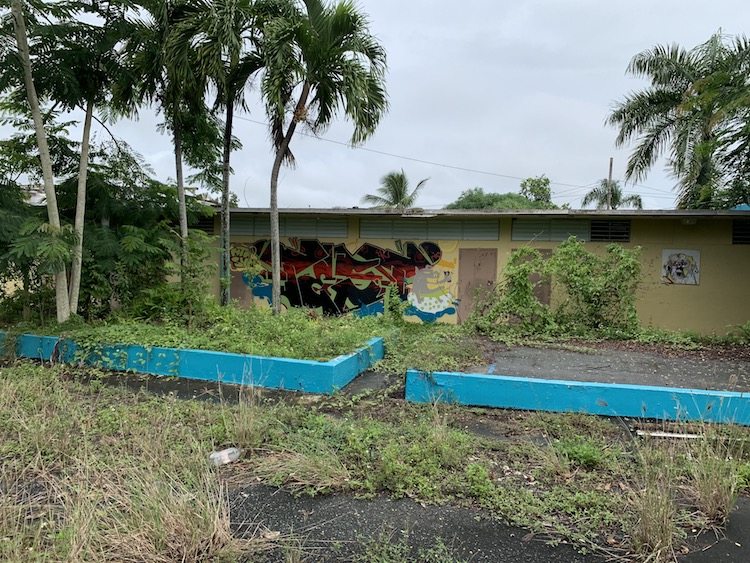
The municipality of Barceloneta was interested in two schools in Arecibo — the Domingo Ruiz and Francisco Susoni — at a price tag of $626,000 for both. Mayor Wanda Soler Rosario did not answer questions from the CPI about the intention to buy schools in Arecibo. The resolution approving the acquisitions shows that the schools were used as Head Start centers since 2015. The first facility has a sign identifying program and remodeling is underway in one of its buildings. The second school does not appear to get regular maintenance, although it was used as a polling station in November elections.
The town of Isabela proposed to buy the Luis Muñoz Rivera School for $970,000. The five-building complex is next to a Head Start center and has been abandoned for a long time.
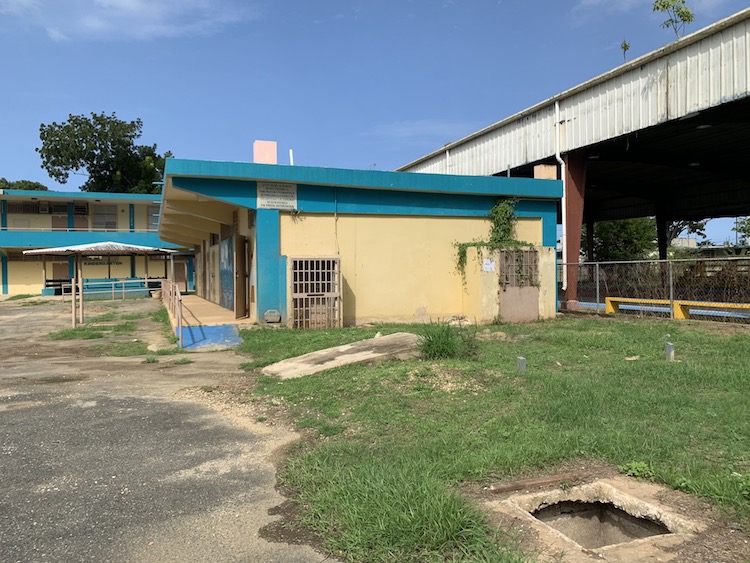
Photo by Tatiana Díaz Ramos | Center for Investigative Journalism
The municipality of Barceloneta did not say what is the plan for the Francisco Susoni school in Arecibo.
Nonprofit organizations also purchased schools to expand Head Start program services. For example, The New York Foundling, which has served pre-schools in Puerto Rico since 1975, acquired the Rufino Huertas School in Coamo and the Rosendo Matienzo Cintrón School in Cataño, for a total of $1,460,000. Both schools will be demolished starting in January because they have asbestos, said the organization’s director, Carmen Villafañe.
It took 15 months for the Iglesia Bautista de Quintana Inc. Head Start Program to close the acquisition of the Isaac González Martínez School in San Juan. The facility closed since 2017 is vandalized, its parking lot is being used as an auto mechanic shop, and a broken faucet constantly wastes water. The organization has accrued $1,278,740 in government contracts since 2009, mainly with the Administration for the Care and Comprehensive Development of Children (ACUDEN in Spanish) as a delegate agency of the Head Start program.
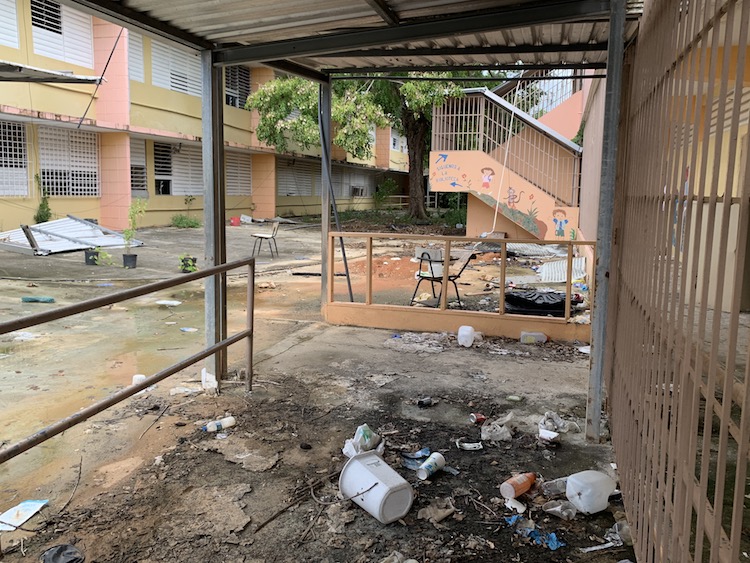
Photo by Tatiana Díaz Ramos | Center for Investigative
The Baptist Church of Quintana bought the Isaac González Martínez school in San Juan.
Early in 2020, the sale of El Parque School in San Lorenzo to Fundación para el Desarrollo del Hogar Propio Inc. was approved for $275,000. The nonprofit organization has had contracts with the Government since 2009 for a total of $19,993,672, most of them with ACUDEN as delegate agency of the Head Start program.
The Foundation’s fiscal manager, Aníbal Arroyo, explained that, “after Hurricane María, the federal government gave the Head Start program the option to use recovery funds to relocate centers that were severely damaged or that were in flood-prone areas. One of the places that we proposed to the federal government was the Escuela del Parque, the transaction was approved, and the money allocated, but we’re still negotiating with the local government.”
Private educational organizations
Although the Legislature issued a resolution in October 2019 to cede the Segundo Ruiz Belvis School of San Juan to nonprofit organization Feria Internacional del Libro de Puerto Rico Inc., in December of that same year the Banco Popular Foundation bought it for $1,200,000, “to establish a center that will offer vocational education for adults and an arts program for youth from nearby communities, both at no cost to participants.” The campus already has “private property” signs on it, but it has been vandalized and portions of its roofs need urgent repair.
The Foundation stated that this school was selected “because of its location and proximity to potential partners and schools that can send their students to benefit from the services and programs that will be offered. The center will be modeled after Manchester Bidwell Corporation, a Pittsburgh-based nonprofit organization that has collaborated with other organizations to establish centers in more than 10 cities in the United States and Israel.”
The Fountain Christian Bilingual School, linked to the Reverend Otoniel Font’s Concilio Misión Cristiana Fuente de Agua Viva Inc., started off leasing the Julia de Burgos de Carolina School in 2018 until it bought it for $612,000 in August after seven months of negotiations to get CEBDI’s approval for their proposal.
Mil Máscaras Academy Inc., a school specialized in Fine Arts, also started off leasing the Rafael Hernández School in 2018, until it bought the campus in Hormigueros in November for $240,000.
“The deed was finally signed on October 22. We’ve been dealing with this since 2017. In January we accepted the government’s counteroffer and in August they began to draft the deed,” Academy CEIP Inc. President María Da Silveira, recalled about the Nereida Alicea Cruz School in Caguas. “They left desks, blackboards, even a trailer there,” but no matter how many times she called the DE, they never came back for any of it.
A facility in Hato Rey will be occupied by the Puerto Rico School of Nurse Anesthetists after the Sociedad Española de Auxilio Mutuo Hospital bought the Buena Vista School to house the professional nursing program.
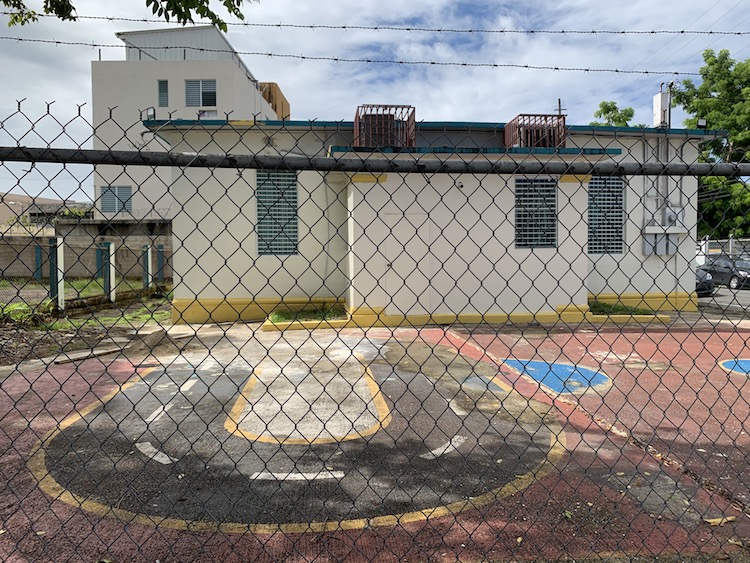
Photo by Tatiana Díaz Ramos | Center for Investigative Journalism
Bella Vista School will be a Nursing School for Auxilio Mutuo.
Green light for commercial proposals
David Barreto Bosques’ company offers repair services to the Puerto Rico Aqueduct and Sewer Authority (AAA, in Spanish). Since the Toribio Lasalle Bourdon School in Moca is close to his office, he bought it for $38,000 “to store my equipment and trucks.” He described the structure as “very small. It was closed for more than 10 or 15 years, it was very abandoned,” although he has already done some repairs.
“The cafeteria had to be demolished and the gate was fixed. In the land alone, I invested $10,000 because it’s in a flood-prone area. I remember that when I went to school here and it rained, the teachers had to dismiss us because everything flooded and there was no way out. When I finish [the repairs] the cost will be around $80,000 or $90,000,” he said.
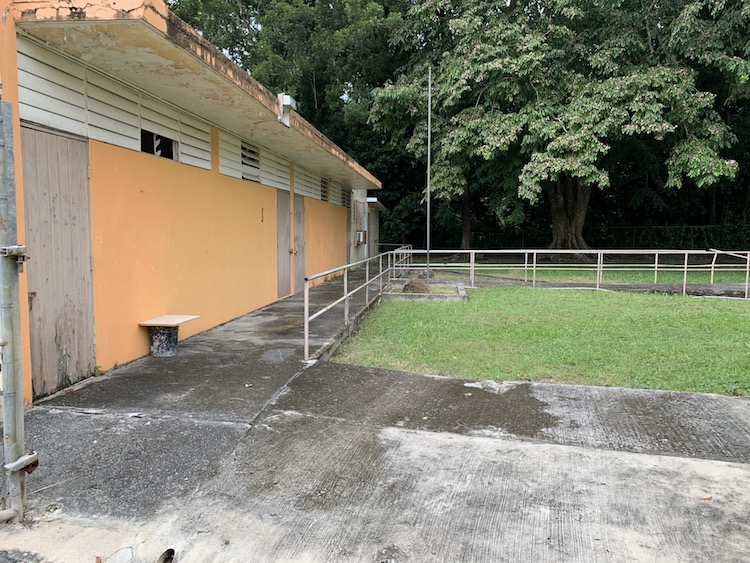
Photo by Tatiana Díaz Ramos | Center for Investigative Journalism
The Pedro Sánchez Delgado school in San Sebastián will be an electromechanical repair shop.
Another entrepreneur looking to expand his business with the acquisition of a school in San Sebastián is Daniel Sosa. Although he has yet to close the sale waiting for financing approval from the U.S. Department of Agriculture Rural Development’s Business and Cooperative Program, there is already a sign on the Pedro Sánchez Delgado School that reads “Soon, Electromecánica Automotriz Sosa.”
“They gave me that school about a year and a half ago, but the documents were nowhere to be found. They sent me on a wild goose chase through a thousand offices and nobody had any information. About three or four months ago they called me to tell me they were dealing with the deeds,” Empresas Playa Joyuda Inc. President, Julio C. Pérez Perichi, told the CPI, adding he plans to expand Hotel Perichi’s through the acquisition of the Luis Muñiz Souffront School in Cabo Rojo.
The Ramiro Colón Colón School in Ponce could become something similar to the Joyuda hotel. La Rambla Plaza, a limited liability company, proposed to buy the facility almost a year ago for “office space, student residences or a small 30-room hotel,” its President Leslie Derek Fleming Negrón, said in an email.
The real estate broker and New Progressive Party donor also runs Del Mar Investments SE, which has had Government contracts since 2013 for a total of $12,024,439, mainly through property or real estate leases with the DTOP, the municipality of Ponce and the Puerto Rico Electric Power Authority (PREPA).


